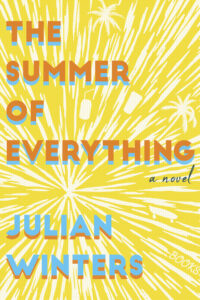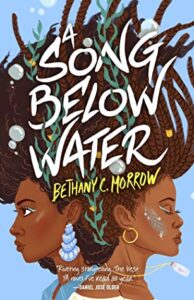“The Beauty That Remains” Is a Raw and Liberating Meditation on Grief and Music
“The Beauty That Remains” Is a Raw and Liberating Meditation on Grief and Music
Grief that results from the loss of a loved one is something we all experience at some point. Experiencing death as a teenager or young adult is especially painful, however, because these are formative years when having your loved ones around is crucial.
In Ashley Woodfolk’s 2018 book The Beauty That Remains, Autumn, Shay, and Logan gradually learn to cope with their grief and become connected by their mutual love for the band Unraveling Lovely.

Told through the viewpoints of the aforementioned characters, The Beauty That Remains provides a strong, intricate narrative about grief that is very notable. In the initial aftermath of their losses, each of the characters copes differently. Autumn tries to go about her daily life as it was before the death of her friend Tavia but soon finds herself sending emails to Tavia and pushing away Tavia’s brother, Dante. After her twin sister, Sasha, dies, Shay attempts to run away from her grief. Finally, Logan deals with the death of his ex-boyfriend Bram through self-destructive behaviors such as drinking.
In addition to the leads, their lost loved ones are fully fleshed out characters who have a presence in their lives even after their passing. Tavia, aka Octavia, is boisterous, loving, and inspirational; she is a nice foil to the quiet, introverted Korean artist Autumn. Sasha’s enthusiasm about music is both painful and comforting to Shay, a Black indie rock music blogger. Bram’s troubled and gregarious nature haunts gay red-headed musician Logan to the point where he can’t write songs, but he can watch his ex-boyfriend’s old YouTube videos.
Not only do the lead characters cope with their grief differently, they also get help for it in different ways. Logan is forced to see a psychiatrist by his parents after he gets caught with his father’s liquor. Following an emotional breakdown, Autumn slowly learns to open up to Dante, her older sister Willow, and Tavia’s ex-boyfriend Perry. Meanwhile, Shay gets an unexpected intervention that leads her and her mother to different support groups. It is moving to watch each character find solace in someone or something they didn’t think would help them process their grief.
All of the characters show how complicated and messy grief can be. Sometimes, grief will make you lash out at loved ones, avoid them, or self-destruct. These responses are neither healthy nor excusable, but they happen. Grief can also result in strong physical reactions, such as the panic attacks that Shay has. Autumn’s sister Willow sums up the situation well when she says that Dante and Autumn have suffered “a great trauma.” Given that some people think grief is a temporary mood, like anger or sadness, it is gratifying to see grief depicted as something that strongly impacts mental, physical, and emotional health.
As a result of coming to terms with their grief, each of the lead characters is able to see “the beauty that remains,” which can be understood as the good things they still have despite who they have lost. Not only do they have loving friends and family who are still alive, they also have small and big things in their lives that they can enjoy. For Autumn, it’s drawing and reading books. For Shay, it’s running track. And for Logan, it’s writing songs. Yet the common love they all share is music, especially the band Unraveling Lovely.
Most of us know that music can be a powerful way to soothe and convey feelings that are otherwise difficult to express. When seen through the lens of grief, music can be both painful and wonderful. This is demonstrated when Shay walks out on a live performance of an Unraveling Lovely song that was sung to Sasha before she died. Music is a coping mechanism for all the characters, but they engage with it in different ways. Shay is a music blogger for her and Sasha’s website BAMF (Badass Music Fanatics), Logan is the former vocalist and songwriter for the band Unraveling Lovely, and Autumn listens to music, watches music-inspired films, and has Unraveling Lovely’s former guitarist Dante as her love interest.
While there was much about The Beauty That Remains that I enjoyed, I would point out that the book’s huge cast is both a strength and a weakness. On the one hand, the characters are diverse in terms of ethnicity, gender, and orientation, and almost every character plays a role in the healing the lead characters undergo. On the other hand, there were times I mixed up the characters or forgot who certain ones were, especially those who were in different bands. However, this did not ruin my enjoyment of the book.
All in all, The Beauty That Remains is a raw and liberating meditation on grief and music. Grief is a traumatic experience that everyone deals with differently, but this book shows that with help, you can still have wonderful things in your life despite the loss you’ve experienced. With music as their common thread, the characters blog, sing, and listen to words that bring them solace and keep the memory of their lost loved ones alive.

The Afro YA promotes black young adult authors and YA books with black characters, especially those that influence Pennington, an aspiring YA author who believes that black YA readers need diverse books, creators, and stories so that they don’t have to search for their experiences like she did.
Latonya Pennington is a poet and freelance pop culture critic. Their freelance work can also be found at PRIDE, Wear Your Voice magazine, and Black Sci-fi. As a poet, they have been published in Fiyah Lit magazine, Scribes of Nyota, and Argot magazine among others.


 One aspect of the book that immediately drew me in was Wesley Hudson’s internal voice. He sounds chill, anxious, and nerdy all at once due to the pressures of adulthood towering over him. A bit of internal dialogue that demonstrates this goes, “Frankly, Wes doesn’t know who he wants to be in five minutes. An influencer? A teacher? Alive after suffering through that last chapter of his mom’s book?” Wes’s voice is also evident in the various lists he makes to weigh his options and determine how much he likes someone or something. For example, his list titled “Five Things I Love the Most” has Once Upon a Page at number two. He calls the store his “safe place” where he doesn’t have any stress and can be himself.
One aspect of the book that immediately drew me in was Wesley Hudson’s internal voice. He sounds chill, anxious, and nerdy all at once due to the pressures of adulthood towering over him. A bit of internal dialogue that demonstrates this goes, “Frankly, Wes doesn’t know who he wants to be in five minutes. An influencer? A teacher? Alive after suffering through that last chapter of his mom’s book?” Wes’s voice is also evident in the various lists he makes to weigh his options and determine how much he likes someone or something. For example, his list titled “Five Things I Love the Most” has Once Upon a Page at number two. He calls the store his “safe place” where he doesn’t have any stress and can be himself.

 Tavia Phillips is a siren who must hide her powers in order to keep herself alive. Her best friend, Effie, is struggling with a painful past and strange happenings in the present. While they are trying to navigate their junior year of high school, a siren murder trial shakes Portland, Oregon, to the core. In the aftermath, Tavia and Effie must come together and come to terms with themselves.
Tavia Phillips is a siren who must hide her powers in order to keep herself alive. Her best friend, Effie, is struggling with a painful past and strange happenings in the present. While they are trying to navigate their junior year of high school, a siren murder trial shakes Portland, Oregon, to the core. In the aftermath, Tavia and Effie must come together and come to terms with themselves.







Recent Comments